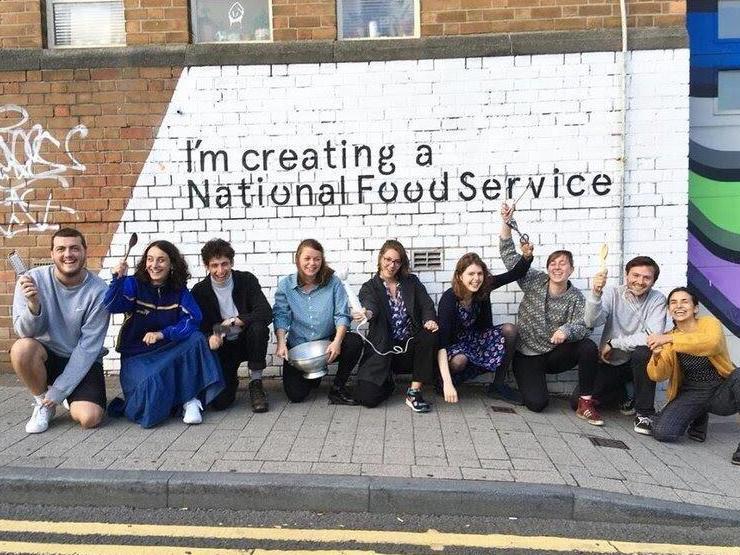Help The Hungry: The volunteers building a National Food Service in the time of coronavirus
With an estimated three million people going hungry during lockdown, activists are working to build a universal food provision programme, writes Mark Critchley

The argument for the universal provision of basic needs, free at the point of use, has arguably never been stronger. But as the country fights its greatest health crisis in a century, it also has an estimated three million people going hungry during the lockdown. The coronavirus pandemic has shown why the National Health Service is of such immense importance. What if there could be a National Food Service too?
There is in fact a project bearing that very name. The National Food Service is a network of initiatives committed to tackling food insecurity, social isolation and food waste. It is currently made up of 13 branches stretching from Glasgow to Falmouth and over the last few weeks it has begun to forge new links all over the country. It will not stop there. “We think there should be a National Food Service in every city of the country. That’s the aim,” says Selina Treuherz, one of the activists behind the service.
That may sound incredibly ambitious but Treuherz argues that the foundations of what the NFS is attempting to create already exist. Thousands of local groups have led the fight against hunger in their communities for the best part of a decade or more. “What we’re saying is we don’t need the state to come in and build a National Food Service,” she explains. “It’s just about working together to make it stronger and to strengthen the communities in the areas that need it most.”
In practice, that means social eating spaces where those in need can come and enjoy a meal with others. “I feel like we are proving it can be done now,” Treuherz adds. “Our founding branch, Food Hall in Sheffield where I volunteer, has been running for five years. We’ve been serving the community on a contribute-what-you-can basis. It might seem like a radical idea but it’s not at all. It’s just people helping each other with the means that they can.”
A fully realised NFS would not be government-run like its health equivalent. Each existing branch in the network is autonomous. They share values, resources and the same overarching goal – to ensure that nobody goes hungry – but they operate independently and in different ways to each other. This means there is “not a single point of weakness”, Treuherz says, such as an over-reliance on central funding. The NFS is only beholden to the people it helps feed. “We’re built by each community for the community.”
But the pandemic presents new challenges. An organisation designed to bring people together through food is now having to focus on merely feeding them and support is needed. NFS branches are still operating, making around 3,000 meals since the lockdown began and delivering food parcels to communities in need, but they have found that they are often required to step in where the response from local government is falling short.
“If I’m honest, I’ve been on the helpline quite a lot and the government response is pretty shocking,” says Treuherz. “We’re getting a lot of people ringing up saying they’ve had one parcel and been told that’s their lot, and they’re on their own in the house.” The parcels supplied by councils have often been low on food. Even when the boxes are full, they can be of little nutritional value.
Food waste has also increased following the wave of stockpiling at the beginning of the crisis. The branch at which Treuherz volunteers in Sheffield used surplus stock from supermarkets to help feed those in need but they are currently struggling to meet demand. “We actually can’t get enough food to feed enough people,” she says. “It’s really sad. You run out of food at the end of the day and you just can’t help everyone.”
To help voluntary groups provide emergency food for those in need during the crisis, the NFS has petitioned the government with three demands: to offer more support for organisations tackling food insecurity; to reduce barriers to immediate food access; to protect community spaces and increase access to kitchen facilities. “It’s given about £3.25m to food waste groups which just is not nearly enough for a national effort,” explains Treuherz.
But even in a pandemic, there are positives to be found. “Community groups are coming together, there’s this whole idea of mutual aid and food is playing an essential role in that,” she adds. “It’s really important that we build on this for the future and this doesn’t end at the end of Covid-19 because this is such an opportunity for change both within our food system and the rest of society,” she adds.
Britain will look radically different after this crisis has passed. A national food service may need to be part of its landscape.
Subscribe to Independent Premium to bookmark this article
Want to bookmark your favourite articles and stories to read or reference later? Start your Independent Premium subscription today.

Join our commenting forum
Join thought-provoking conversations, follow other Independent readers and see their replies